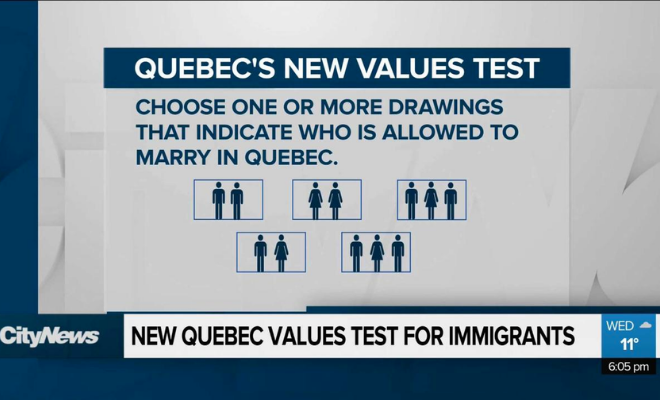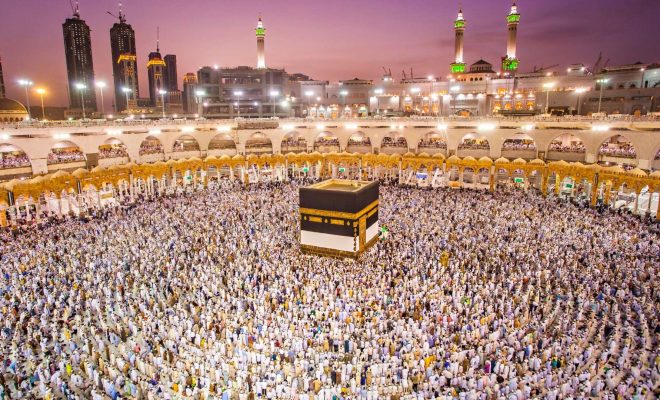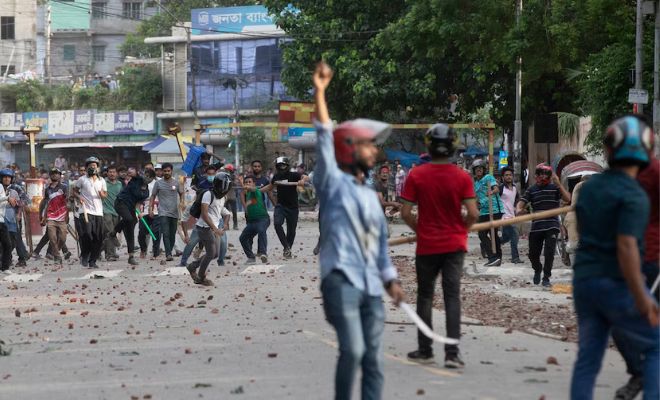A Test of Our Values

At the end of October, the Coalition Avenir Quebec (CAQ) – which is the ruling party in Quebec – announced the introduction of a provincial values test that some immigrants will have to undergo as a requirement to live in the Quebec.
The test will be applied to economic migrants, not students, or those who have come as refugees, or minors with medical exemptions. The test is entirely symbolic, asking basic questions about the political values that are known to anyone who has lived in Canada, and there is no real consequence to failing it. If you fail, you are given two additional times to pass it, and if you fail the third time you will have to take a one-day class.
In defending the test, Premier Francois Legault said, “I think it’s important if somebody wants to come and live in Quebec to know that, for example, women are equal to men in Quebec.” He added that some religious extremists don’t share this view.
Apart from being functionally useless and patronizing, what purpose does this test serve, and what does it tell us about Canada’s treatment of Muslims?
Quebec – A History of Intolerance
Ever since the publication of the Taylor Report in 2008, governments in Quebec have been trying to impose control over the minds and bodies of Muslims. There have been numerous attempts to ban the Islamic dress for women, from the early attempts to ban the Niqab, to the successful Bill 21 that makes it impossible for religious minorities to wear a religious symbol while being in certain government positions. Bill 21 is the first Hijab ban in all of North America.
This “values test” is part and parcel of this anti-Muslim campaign of bigotry. Quebec governments – after proving to be unable to provide any real or meaningful solutions to the wealth inequality, social instability, and debt slavery caused by Capitalism – have made the “protection of the Quebec identity” a key plank in their platform.
This allows them to take symbolic actions against minorities, invoking and catering to the primitive bonds of tribalism and cultural chauvinism, under the guise that some agreed-upon set of Quebec values have been successfully rescued from the invading hordes of immigrants.
It is important to note that bigotry such as this does little to address the legitimate grievances of the people of Quebec. Business groups across the province are noting a lack of skilled labor, and political manipulation and hostility of this fashion is driving more people away from the province, while making it less likely that new skilled workers will want to come in.
The Incoherence of “Canadian Values”
Apart from there being no single “Canadian” answer to these questions, the way the elite would even address this issue would be based on some mixture of their own perceived self-interest, and their narrow and limited vision of what is morally acceptable and politically convenient. Such an idea is doomed to have no reality, as man is fickle and changes from time to time.
There is no meaningful consensus on the equality of men and women for example, as the average Canadian may have very different perspectives of what this equality should look like.
Is it an equality of outcome or an equality of opportunity? Is it a moral equality, or a complete erasure of gender roles?
The Canadian political elite do not rely on absolute principles and prescriptive solutions revealed by the Creator of the Universe to address the moral and social issues of the day; rather, acceptable politics in Canada is built upon moral relativism (there is no good or evil) and the maximization of absolute freedom, which fails to define limits upon us so that we can be responsible towards each other and accountable to Allah (swt).
For example, secular politics holds that the end justifies the means, without any consideration to what pleases Allah (swt).
In the absence of such accountability, the political elite are free to do whatever suits them, and justify their actions under the pretext of the lesser evil, the ends justifying the means, or some other form of moral relativism.
So how can anyone integrate into such an idea that shapeshifts based on the flavor of the day? This is especially problematic for Muslims who have their own Aqeedah and laws for their actions.
Is it just Quebec?
It should be clear to Muslims that the campaign of forcible integration being initiated in Quebec is indicative of a larger trend across Canada.
It is not restricted to one province.
In Alberta, we have Jason Kenney – a man who was responsible for the proposed policy to ban the Niqab during the Canadian oath ceremony – elected as Premier.
In Ontario, we have seen successful attempts to radically alter the sexual education curriculum and have had to resist government attempts to monitor and restrict our children from giving a Friday Khutbah of their choice at high school Jum’ah prayers. And in this past election we have seen elected officials from all the major parties come together to tell Muslims that it should be their top priority to make themselves useful to the political parties, by donating out time, money, and political support to them, in return for protection against bigotry.
This paternalistic and integrationist attitude towards Muslims is just as much of a danger to the Islamic identity as anything happening in Quebec, even if it is less patronizing and less confrontational.
And it is not like the actions of the province of Quebec are happening in isolation; they have the tacit support of the Federal government. Quebec’s secularism bill received no meaningful resistance from any of the major political parties in the lead up to the election, and Trudeau has publicly defended Quebec’s right to impose its values test.
During the French language debate in the lead up to the election, Trudeau said: “If [Legault] wants to apply a test for the certificate of selection, that’s okay and it’s appropriate for him to do so.” During a follow up he added, “The questions on that test are to be determined by Quebec.”
The difference in the approach to the assimilation of Muslims between Quebec and the rest of the country is one of style, not substance.
Open intolerance to Islamic values is politically acceptable and even useful in Quebec, while soft integrationism holds more currency in the rest of Canada.
Responding to the Call to Integrate
It is tempting for many Muslims, when confronted with raw bigotry, to insist that we are not so different than the dominant culture and values. Some may even go as far as seeking alliances with those who are more accepting of diversity, and are not as prone to cultural chauvinism.
It should be clear though, that this proximity to the dominant culture – even its more tolerant elements – comes with a cost. In seeking nearness to the dominant culture, in joining and allying with “tolerant” political movements, we would have to endorse the inherent immorality and individualistic self-interest that is the engine of Capitalist/liberal society. And in trying to shape ourselves as a model minority of proud Canadians, we would have to ignore the brutal colonial history of Canada and reinforce the myth of a Canada that is not built on the misery of indigenous nations and the working poor.
In essence, by seeking protection through proximity to Canadian values and political systems, we will lose the very thing we were fighting to protect: our identity as Muslims. Instead of centering our political beliefs and actions around the Word of Allah (swt), we will be condoning, aiding and abetting the exclusion of the Creator from public life. And instead of conveying the call to enslave ourselves to the Almighty, we will end up carrying the banner of freedom from His laws and rejection of His Authority.
Instead of Muslims insisting on proving our “Canadian-ness,” would it not be more beneficial for us to work together to convey Islam’s perfect solutions to the problems facing Canadians?
Instead of tripping over ourselves in seeking acceptance from the corrupt elite, would it not wiser to demand justice for the many who have been left behind by the established social order, including the poor, the indigenous nations, and the racial minorities?
And instead of seeking our protection through secular political systems and their political and economic elite, should we not seek it from the One who created us in the womb, breathed life into us, and conveyed to us our purpose? It is part of our Aqeedah to know that our protection comes from Allah (swt), and that He alone strengthens us and sustains us.
As our beloved Messenger (saw) tells us:
“Know that if the whole world were to gather together in order to help you, they would not be able to help you except if God had written so. And if the whole world were to gather together in order to harm you, they would not harm you except if God had written so.” [Tirmidhi]
Recognizing this reality allows Muslims to focus on the only relevant mechanism of protection in their lives: their relationship with their Creator.
There is no force that can overpower Him (swt), and there is nothing that can protect us from the consequences of disobeying Him.
“Allah will protect you from them: He is the All Hearing, the All-Knowing. And say: ‘Our way of life is the natural way chosen by Allah, and who gives a better natural way than Allah? And we are dedicated to Him in worship.” [2:137-138]









